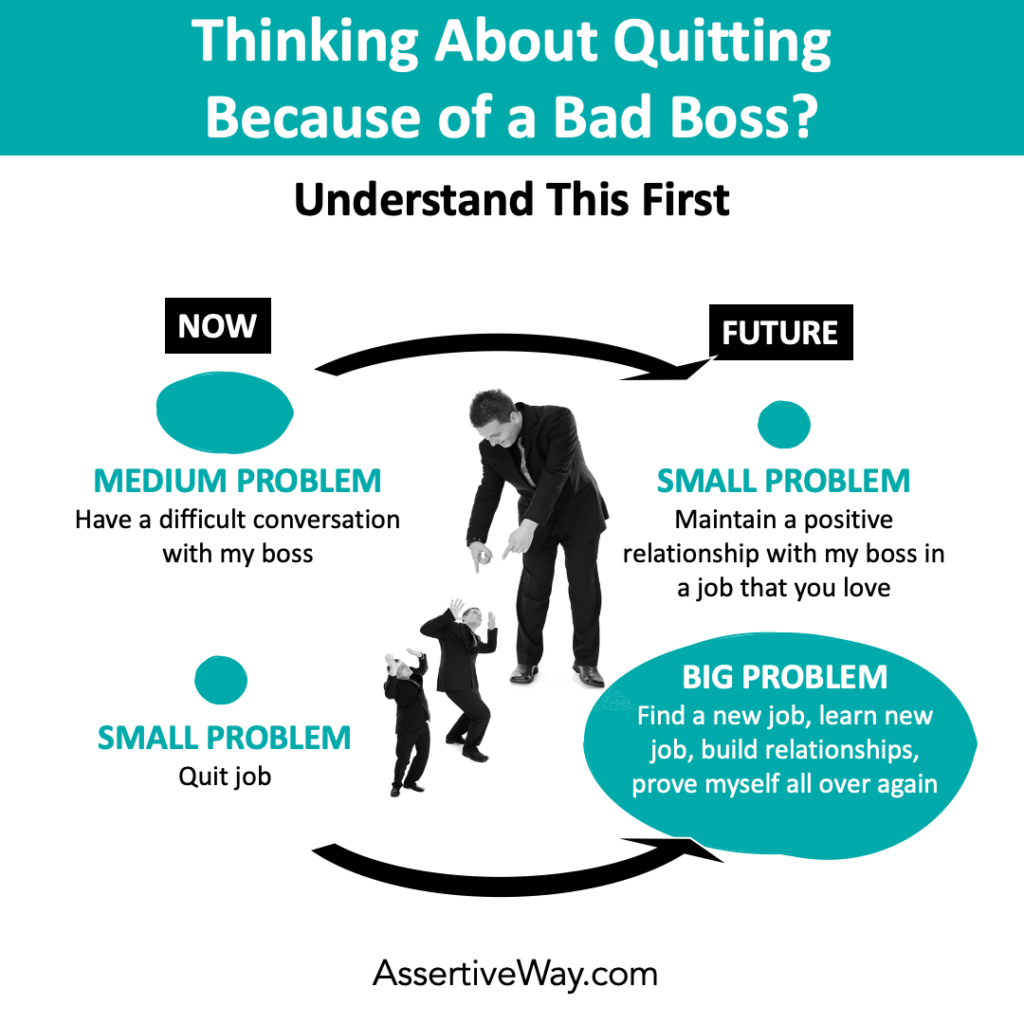Do this before you quit because of a bad boss.
By Assertive Way
Susan leaves a job because of a boss that doesn’t listen and that withholds opportunities.
After a long stressful job search, Susan finds a new job and it all looks great for the first weeks, but within a few months she starts to notice the new boss doesn’t recognize her work and micromanages her. After a year, Susan decides to quit and starts job searching again and finds a new job.
In her third job, everything flows nicely in the first few months, but then the problems arrive. Her boss loses two people in the team and dumps all the extra work on Susan. She feels overwhelmed, frustrated, and stressed. She decides to leave but is only able to find a job in a different city. Now she needs to move to a less preferred location, deal with children school changes, and her partner’s job search.
This situation happens a lot in many people’s careers, because they don’t realize the real problem.
Do you see the pattern and problem here?
It will be hard for Susan to find a boss that she will be entirely happy with. Some bosses will micromanage, some won’t listen, some won’t appreciate your work, some will steal credit, some won’t treat you with respect, some won’t give any training or feedback, some won’t give any guidance, some will have unrealistic expectations and deadlines, some will be controlling, and some will be super disorganized.
Therefore, Susan will continue to change jobs and continue to find problems with her boss. The problems will change, but there will still be problems. They will be entirely new problems.
She will continue to change jobs and continue to find problems with her boss. The problems will change, but there will still be problems, entirely new problems.
Guess who suffers the most in this process? Susan!
Changing jobs is hard, time consuming, and have the risk that you may not like the new job much.
- Job searches are stressful.
- Starting a new job is hard because you need to prove yourself and build your networks all over again.
- Creating a relationship and building trust with a new boss is not easy.
You have 2 choices
When there is a significant problem with your boss, you have two options:
- To have the difficult conversation with your boss
- To not have the difficult conversation with your boss
Even though it takes some courage and preparation to speak up and ask for what you want, the future rewards are huge! Not only that, you avoid large future pains. Focus on the future gains more than the short-term fear of confrontation.

Did Susan try to resolve the issue directly with her boss before quitting? No!
Here’s an important statistic you need to know
People don’t leave bad jobs, they leave bad bosses.
Did you know that 6 out of 10 bosses never received manager training according to CareerBuilder studies?
That means that more than half of the managers you will ever have won’t have a proper understanding of how to manage people. They got promoted to that position because they did a decent job executing or they had a sponsor.
And the few who got training on how to be good managers may not implement it well because it’s not aligned with their personality or they are mostly focused on outcomes because of the expectations of upper management.
Your boss isn’t trying to make you miserable
Not only that, according to Leadership guru Simon Sinek, the middle management is the hardest job in any organization because they need to be tactical, translate to strategic language for upper management, and manage more junior people. They are very busy!
This means that your boss doesn’t necessarily want to make your life miserable; they just struggle with leadership skills and with competing priorities. Your best approach his to work with your boss to sort through those issues.
Your boss doesn’t necessarily want to make your life miserable; they just struggle with leadership skills and with competing priorities. Your best approach his to work with them to sort through those issues.
Do this before you quit
Before you quit, try to speak to your boss directly about the issue that is bothering you. If you do this, you won’t have to change jobs in the first place. This simple strategy will save you a lot of frustration, time, and effort.
Explain what is bothering you and how it affects you and your job. Do so without blaming the boss. Be understanding and give them the benefit of doubt. Be honest and open. Only consider looking for another job if this doesn’t work after a few attempts.
The art of having these difficult conversations in which you advocate for yourself without being aggressive is called assertiveness. Get a free training on how to be more assertive here.
Recap
Having a difficult conversation with your boss about something that is bothering you is easier then having to deal with the frustrations and stress of searching for and adapting to a new job.
Therefore, if you have a problem with your boss, first talk to them about it. If your boss is the main problem in your job, have the difficult conversation before you consider quitting.
“Don’t let the behavior of others destroy your inner peace.” – Dalai Lama
